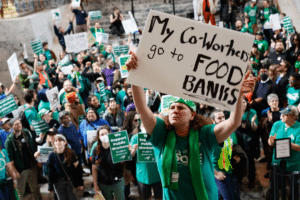The bill requires contracts for projects and payment within 30 days of completion.

Freelance workers often don’t get compensated with the same regularity that salaried, or even hourly, workers do. Instead, they may have to follow up with a client 3 months after their project is done, asking whether a check was cut, got lost in the mail, or is just stuck in some endless queue.
Fortunately for workers in New York City, the Big Apple plans to tackle the issue. Last month, City Council proposed a bill to stabilize the lives of freelancers. This legislation covers freelance projects where a client hires an independent contractor who will be compensated more than $200, and requires that business to then 1) execute a contract that includes a payment due date with the freelancer before the work begins, and 2) pay the freelancer within 30 days of completion of the project (unless the contract states otherwise).
While such regulations will prove difficult to enforce, if they are put into practice by companies who rely on freelancers, it would be a game-changer. As freelance journalist and illustrator Susie Cagle notes, requiring written agreements for freelance work could even be as important as requiring timely payment.
However, even with written contracts, a substantial part of the freelancer’s job often becomes tracking down and ensuring their payment, according to freelancer Alisha Miranda, who works in digital media strategy for startups.
“Being paid on time is a constant battle for me,” Miranda explained. She tends to use boilerplate contracts that she finds online, follows up politely, and then always tries to track down who at the company is in charge of compensating freelancers. But despite that advanced ground-work, she’s constantly chasing down money. Occasionally she’s found herself in a scenario where every contact she had at a company disappeared (whether they all quit or were fired) between the time she took on the project and the time she expected payment.
“I don’t know any person who has figured out a way to get paid on time,” she said.
And it’s not always the client’s fault. Take this anecdote from Jamie Wiebe, writing for the Billfold:
Right now I’m waiting for a paycheck from last month that’s three weeks late — $800. Maybe not much for some, but that’s my rent money. It’s not just the reliability of individual clients that’s up for debate. This check was mailed on time, but somehow disappeared en route, possibly due to our crazy mail-tossing landlady. Or possibly due to the interminable vagaries of the U.S. Postal Service. I don’t know.
This issues of enforcing rights for freelance workers is important for New York City to tackle, since it’s an international hub for actors, writers, artists and other creative people who work independently on a project basis out of coffee shops in Bushwick. Yet the new bill also opens a larger national conversation about the rights of growing workforce made of freelanceers and independent contractors.
It remains debatable as to whether the “freelance economy” — where we’re hurtling toward a changing business landscape where almost everyone works for themselves and contracts out — really exists or not. But if even if this is just a growing “trend”, more robust worker protections are in order. The right to be paid on time could even be added to the right to affordable health care and portable benefits for independent workers, which are now emerging center stage in political and economic debate.
What sets being paid on time apart from the other debates about freelancers, of course, is enforceability. Some freelancers are so skeptical about being paid on time by clients that they have little faith in a law meant to protect them legally.




